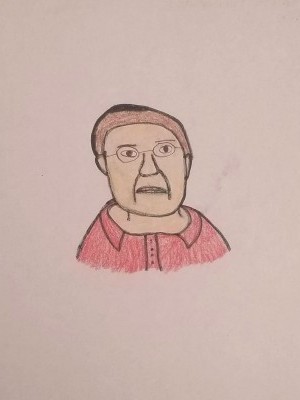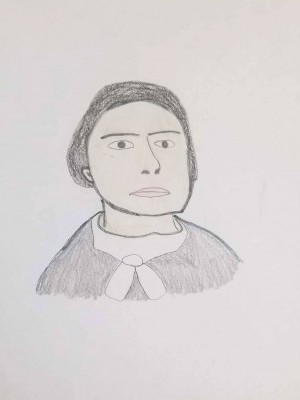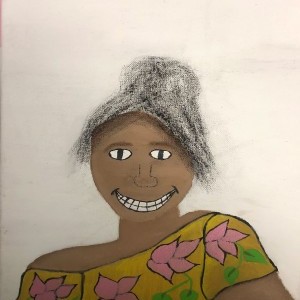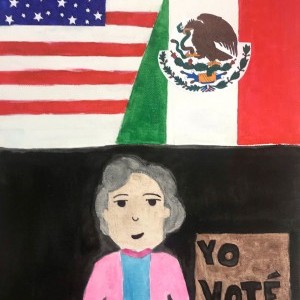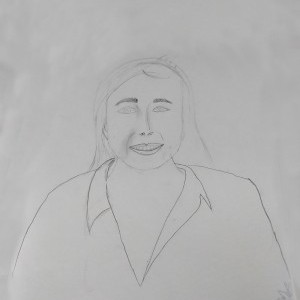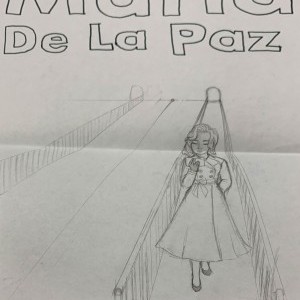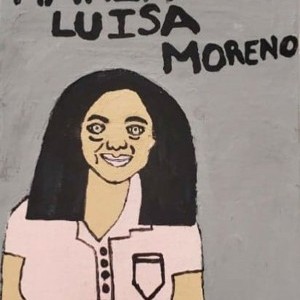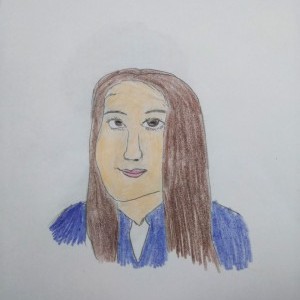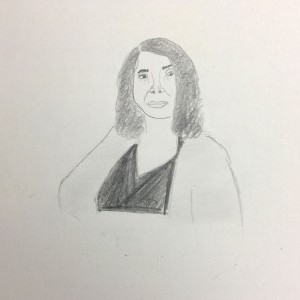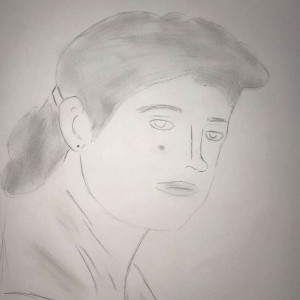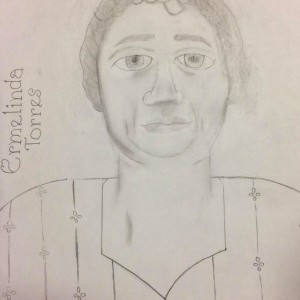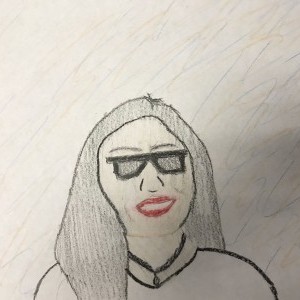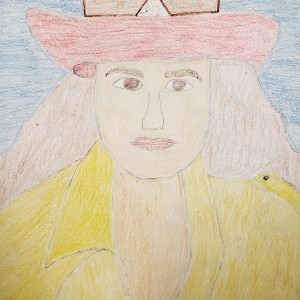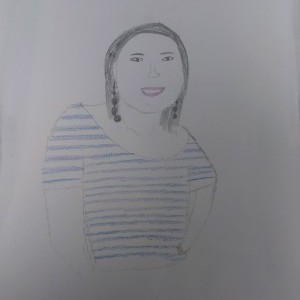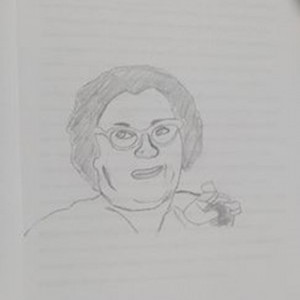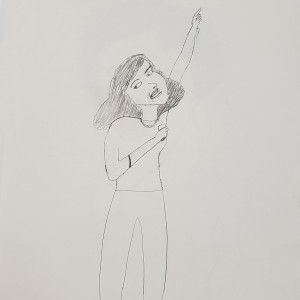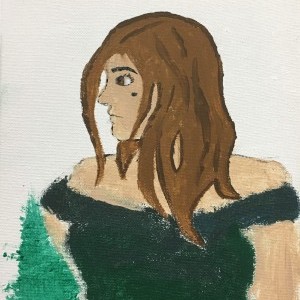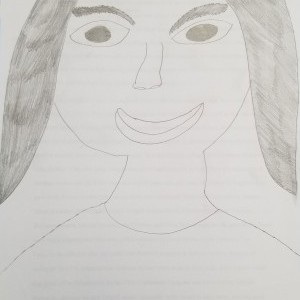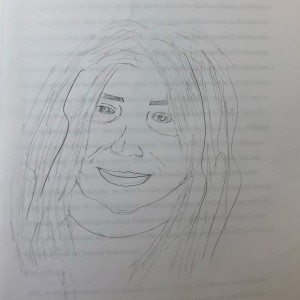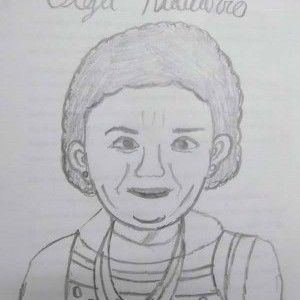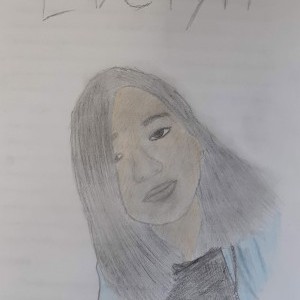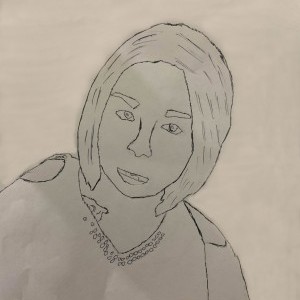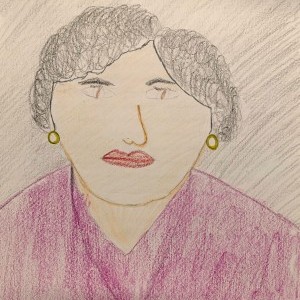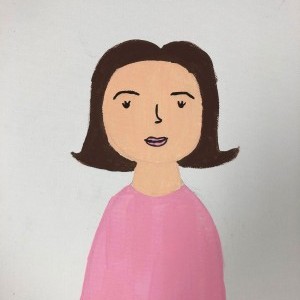Alberto Hernandez
García Early College High School | Laredo, TX | 10th Grade
Inspirational Family Member
My Grandma
The first woman to vote in my family is my grandma from my mom’s side, Dolores Villa Hernandez, born in 1934. My grandma was born to a dad that was very sexist and didn’t care about her or her two other sisters. Her dad wouldn’t provide for her, her sisters, or her mom. Sometimes, my grandma’s mom would have to get plants from a ‘monte’ that was nearby their house and turn those plants into little tacos. Her mom died when she was just seven years old, unfortunately. My grandma and her sisters then moved in with her uncle, her mom’s brother.
From that point on, her life really improved until her uncle passed away when she was 16, and since her uncle’s wife didn’t like her, she got kicked out just two years later at age 18. She would then go off and move with a friend of hers. She would then move out of her friends house in a few months and start traveling around Mexico until she met my grandpa in Mexico City and moved to Nuevo Laredo where she would stay there until she came to the United States and became a U.S citizen. The first president my grandma actually voted for in the U.S was the 44th president, Barack Obama. The reason my grandma voted for him was because she thought he just looked like a really nice guy. My grandma voted for him the second time because she really liked what he had done the four years he had already served as president. My grandma’s hardships in her early life make me feel like my hardships are absolutely nothing compared to hers, and her life really makes me appreciate my dad on seeing how he is and not an irresponsible dad like hers.
Historical Figure I Admire
Susan B. Anthony
Born in Adams, Massachusetts, February 15, 1820, Susan Brownwell Anthony was one of the most prominent figures in the women’s suffrage movement. Susan B. Anthony is probably one of the most known of the woman suffragists. Susan campaigned across the United States for the abolition of slavery, the right for women to own property and keep the money they earned, and also advocated for women’s labor organizations. Susan, along with Elizabeth Cady Stanton, attended her first Women’s Rights convention in 1852 and led the fight for the enfranchisement of women for the following fifty years. Susan had raised $50,000 by 1890 from pledges to ensure the admittance of woman to the University of Rochester. From 1890 to 1900, Susan also presided over the National American Woman Suffrage Association, or NAWSA.
Susan B. Anthony was born to father Daniel Anthony, a farmer and later a cotton mill owner and manager, and mother Lucy, who came from a family that served in the Massachusetts state government and had fought in the American Revolution. Susan was raised religiously and followed the Quaker belief that all people were created equal under God, it would be the idea that would guide her throughout her whole life. Susan had seven brothers and sisters, many of those siblings would go on and become activists for justice and the freedom of slaves, just like her.
Susan would later go on and become a teacher, and after many years of teaching, Susan went back and returned to her family who had moved to New York City. There Susan ended up meeting friends of her father, William Lloyd Garrison and Fredrick Douglass. After listening to William and Fredrick, Susan was moved to do more to help and end slavery. Susan became an abolition activist, even though most people found it wrong for women to give speeches in public. People would often agree with Susan because of how passionate her speeches were.
Susan was a very good strategist. Her discipline, energy, and ability to organize and keep things under control made her a strong and successful leader. Susan and Elizabeth Cady Stanton co-founded the American Equal Rights Association. In 1868, Susan and Elizabeth became editors of the American Equal Rights Association’s newspaper, The Revolution, which helped to spread ideas of rights and equality for women. Susan began to lecture to earn money to publish the newspaper as well as to support the women’s suffrage movement. She became famous all throughout the United States, and while a lot of people supported what she was fighting for, many still hated the ideas she was trying to spread.
Once congress had passed the 14th and 15th amendments, the amendments that gave voting rights to African American men, Susan and Elizabeth were enraged and opposed the legislation because it hadn’t given women the right to vote. They would then go off to form the National Woman Suffrage Association, they did it to push for an amendment that would give the women the right to vote.
Susan was arrested in 1872 after trying to vote, she was tried and fined $100 dollars for the ‘crime’ she had committed. This made a lot of people angry and finally brought the attention the suffrage movement needed. Susan led a protest at the 1876 Centennial of our nation’s independence. She gave a speech written by Elizabeth and Matilda Joslyn Gage, “Declaration of Rights”.
Susan spent the rest of her life working for women’s rights. In 1888, Susan helped to merge the two largest suffrage associations into one group, the National American Women’s Suffrage Association. She led the new group until 1900. Susan traveled around the United States giving speeches, gathering petitions, and lobbying congress every year for women. Unfortunately, Susan died 14 years before women could vote in 1920, but no one will ever forget all the things she did so that women could be equal to men.
SOURCES +
What the Project Means to Me
While I have been listening to my grandma talk about her past for as long as I can remember, I had never thought about her rights or anything like that until the day I ‘interviewed’ her. Women, at the time she was born, had almost no say in the household and the men had all the power. They could be ignored and not treated kindly and no one would say anything about it, especially in a small town like the one she was born into. It was also really cool to experience the past through my grandma’s eyes and not through the general feel of the past like in school. It also taught me that voting is important and everyone should do it, doesn’t matter if it’s local, state, or federal.
Voting in your city can help improve it by voting for an even better mayor that can do his job even better than the one before him, same for voting for a state governor or the country’s leader. It is especially important for you to vote for the next president of the United States; we can’t have the majority vote be a person who will worsen the country, we need one that keeps the country stable or one to improve it.
Explore the Archive
More From This Class
Click on the thumbnails below to view each student's work.Deadline Extended
There's still time to join Women Leading the Way.
Become a part of our storytelling archive. Enroll your class today.
Join the Project

